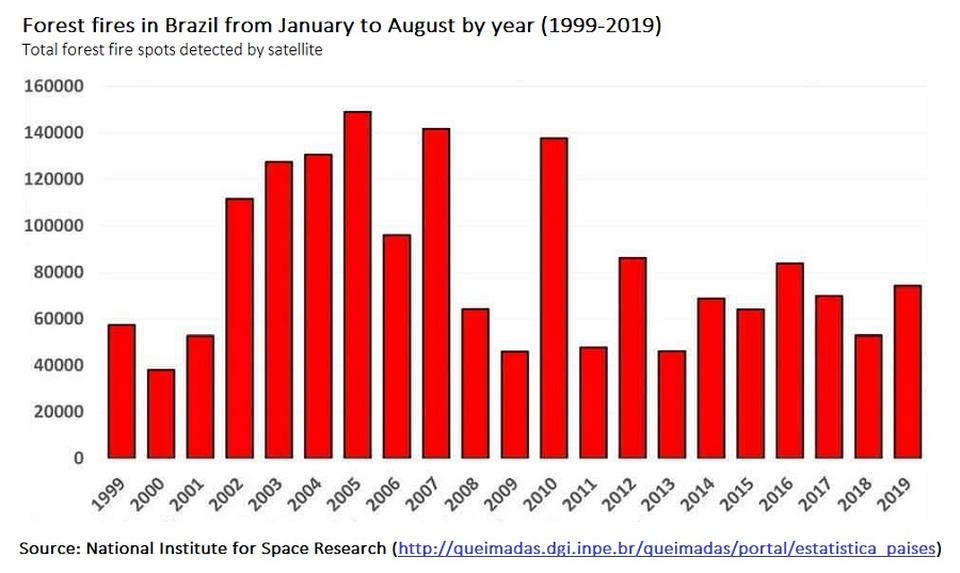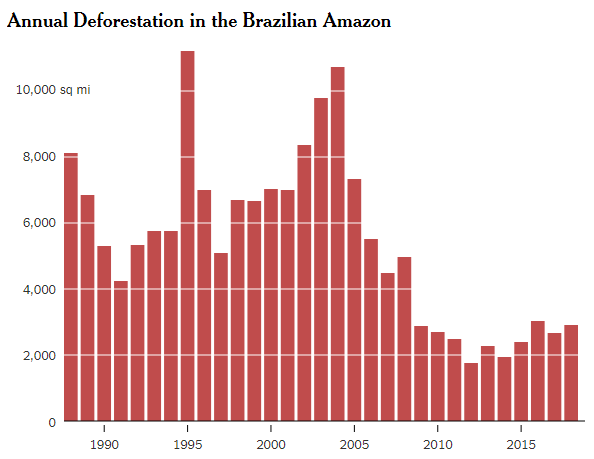The current panic may not be justified, although long-term worries are
Originally published at Legal Planet.
The environmental community is presently up in arms about fires in Brazil’s Amazon. The number of fires have dramatically increased over this time last year. A Greenpeace worker said, “This is not just a forest that is burning. This is almost a cemetery. Because all you can see is death.” France’s president Emmanuel Macron tweeted, “Our house is burning. Literally. The Amazon rain forest – the lungs which produces 20% of our planet’s oxygen – is on fire. It is an international crisis,” and spoke of trade sanctions. And NBC News offers the headline, “Amazon wildfires could be ‘game over’ for climate change fight.”
Fortunately, the situation is not so dire. Farmers in the Amazon region — which includes but is larger than the rain forest (in part due to deforestation) — regularly burn their fields to improve the grass for grazing animals, to clear brush before planting, and to control plant and animal pests. In fact, “a large majority of the fires were on land that had already been cleared,” that is, not in the Amazon rain forest. And while the number of fires at this time of year is (according to satellite imagery) greater than in the last 8 years, there are presently fewer of them than in the preceding years. In other words, the number is about average for the last twenty years:
The real problem is not the fires but deforestation, which has increased since 2012. Even here, perspective is important. Although rising, the rate of deforestation remains about one-quarter of what it was at its past peak:
We Westerners (presumably most readers of Legal Planet) likely bristle when Brazil’s right-wing president Jair Bolsonaro describes Macron’s condemnations of the fires as “colonialist mentality” and when his foreign minister responds with calls for “governing of Brazil by Brazilians.” However, they have some basis for these assertions. The foundation of colonialism was control of natural resources by foreign states — in Brazil’s case, more than three centuries of extraction by Portugal. During the global decolonization period of the 1950s and 1960s, Brazil and other developing countries fought strongly for — and got — the international right to exploit natural resources as part of a state’s sovereignty. This is now half of what is arguably the central tenet of international environmental law, captured in the Rio Declaration’s second principle:
States have… the sovereign right to exploit their own resources pursuant to their own environmental and developmental policies, and the responsibility to ensure that activities within their jurisdiction or control do not cause damage to the environment of other States or of areas beyond the limits of national jurisdiction.
This history is why leaders of developing countries such as Brazil often push back against former colonial powers telling them how to manage their internal affairs. (At the same time, Brazil is a party to the Convention on Biological Diversity, under which it has committed to obligations regarding the conservation of its domestic biodiversity, of which the Amazon rain forest is a hotspot.) Furthermore, like Brazil, much of America’s and especially Europe’s agriculture takes place on former forested land. And Amazon expert Dan Nepstad put it in a more recent and local context: “The Brazilians want to know why California gets all this sympathy for its forest fires and while Brazil gets all this finger-pointing.”
I do not intend to diminish the fires’ genuinely harmful impacts on the environment and humans. Yet we need to remain evidence-based and on focused on the real problems, which here is the ongoing deforestation of the Amazon rain forest. Furthermore, I might be wrong about the extent of this year’s fires. If so, please point me to reliable sources in the comments.


